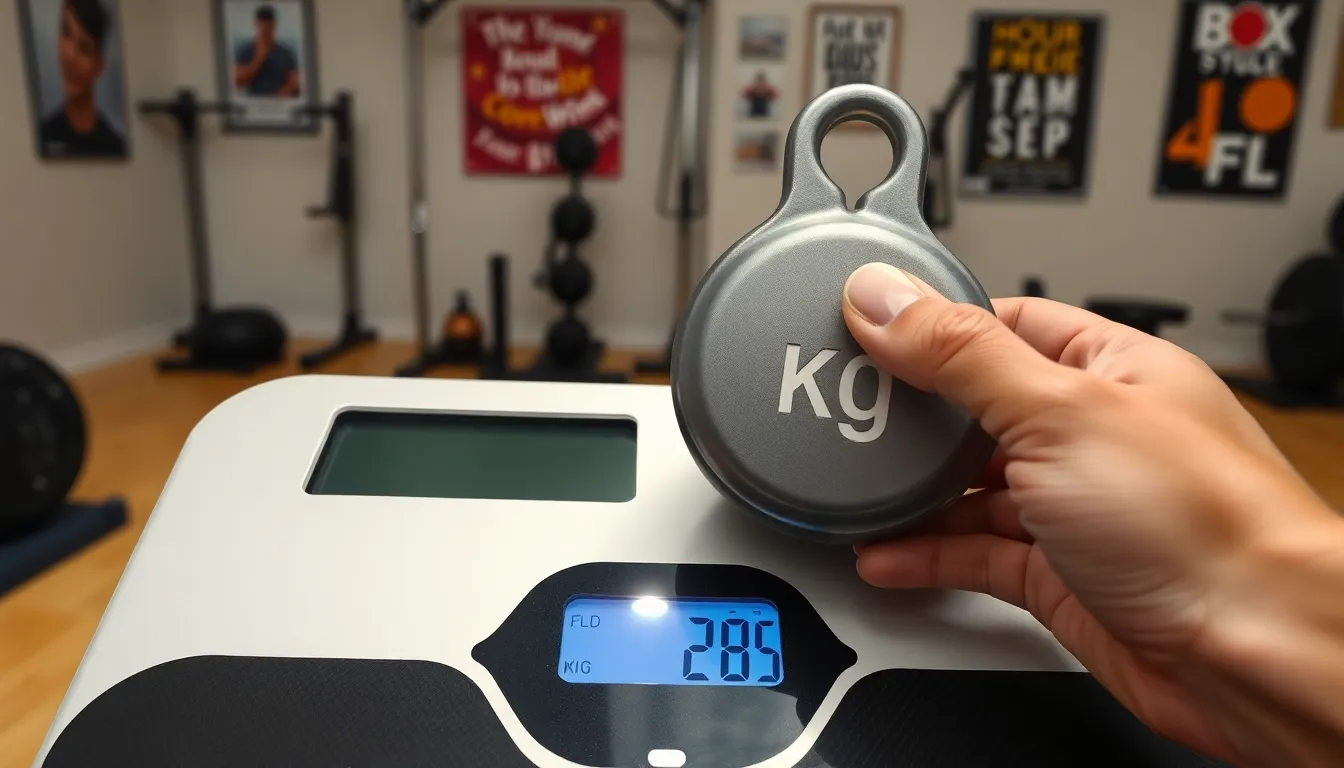Table of Contents
ToggleConverting weight from kilograms to pounds might sound like a math problem straight out of a nightmare, but it doesn’t have to be! Whether you’re trying to impress your friends at the gym or just figuring out how much that giant bag of flour weighs, understanding this conversion can save the day. After all, who wouldn’t want to know how many pounds they’re hauling when they’re lifting weights or shopping for groceries?
Understanding Weight Conversions
Weight conversions between kilograms and pounds serve practical purposes in daily activities. Making these conversions simplifies various tasks, helping individuals better understand weight measurements.
Definition of Kilograms and Pounds
Kilograms measure mass in the metric system. One kilogram equals 2.20462 pounds. Pounds measure weight in the imperial system. This conversion remains essential for understanding weights in diverse contexts, from fitness to cooking. Knowledge of both units enhances clarity when discussing weight.
Importance of Accurate Conversions
Accurate weight conversions prevent misunderstandings. For instance, knowing precise weights aids in making informed decisions about health and fitness. Miscalculating weight during grocery shopping might lead to overestimating or underestimating amounts. Furthermore, businesses benefit from correct conversions for shipping and pricing. Being accurate sustains trust with customers and enhances efficiency.
Conversion Methods

Converting weight from kilograms to pounds can occur through several practical methods. Each method offers a different approach to achieving accurate conversions.
Manual Calculation
Manual calculation relies on a simple formula. Multiply the weight in kilograms by 2.20462 to obtain the equivalent in pounds. For example, a weight of 5 kilograms converts to approximately 11.0231 pounds. This method suits individuals comfortable with arithmetic. Using it ensures a direct understanding of the conversion process.
Using Conversion Charts
Conversion charts provide a quick reference for those who prefer visual aids. These charts list various kilogram values alongside their pound equivalents. Finding the weight in kilograms allows for an instant lookup of its pound counterpart. Many online sources and fitness publications offer these easy-to-use charts. Relying on them can save time while ensuring accuracy in everyday situations.
Online Conversion Tools
Online conversion tools simplify the process even further. By entering the weight in kilograms, users receive an immediate conversion to pounds. Numerous websites and mobile applications offer this service for free. Such tools often feature additional functionalities, like storing previous conversions. Using these digital resources ensures convenience for those needing quick and precise results.
Practical Applications
Converting weight from kilograms to pounds plays a crucial role in everyday life. Engaging in weight tracking, individuals often rely on this conversion to keep accurate records. They monitor progress by converting kilogram measurements into pounds, ensuring clarity in their reports and adjustments. This practice aids in setting achievable goals and maintaining motivation during fitness journeys.
Focus on fitness and health emphasizes the importance of weight conversions in workout settings. Personal trainers frequently use pounds when discussing weightlifting goals, making understanding this conversion essential for clients. Additionally, health professionals may suggest ideal weight ranges based on pound measurements, making accurate conversions critical in assessments.
Travel and luggage requirements necessitate awareness of weight conversions, especially when dealing with airline regulations. Airlines typically set baggage limits in pounds, which requires travelers to convert their luggage weight from kilograms. Familiarity with these conversions can prevent unexpected fees and ensure smoother travel experiences.
Common Mistakes in Conversion
Common errors occur during weight conversion from kilograms to pounds. One significant issue arises from confusing metric units with imperial units. Kilograms measure mass, while pounds measure weight, leading to misunderstanding.
Confusing Units
Confusion often stems from mixing up kilograms and grams. Individuals may mistakenly assume 1 kilogram equals 1,000 grams when converting to pounds. Knowing the correct conversion factor ensures accuracy. Always remember that 1 kilogram equals approximately 2.20462 pounds. Familiarizing oneself with these differences can prevent errors and enhance understanding of weight measurements in various contexts.
Incorrect Use of Conversion Factors
Using the wrong conversion factor creates inaccuracies in calculations. Many converters exist, but not all use the precise value of 2.20462 pounds per kilogram. Some settings might round the figure, leading to slight discrepancies. Users must verify their sources to ensure they apply the exact factor for accurate conversions. By checking their calculations, individuals can avoid common pitfalls and maintain accuracy throughout their weight assessments.
Understanding the conversion from kilograms to pounds is essential for anyone dealing with weight measurements. Whether it’s for fitness goals grocery shopping or travel planning knowing how to convert these units can simplify daily tasks and enhance clarity. By using methods like manual calculations charts or online tools individuals can ensure accuracy and avoid common mistakes. This knowledge not only aids personal tracking but also supports effective communication in various settings. Embracing these conversions leads to better decision-making and a smoother experience in everyday life.







